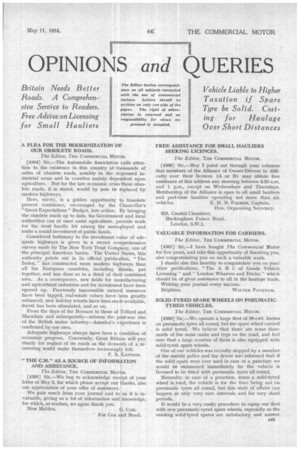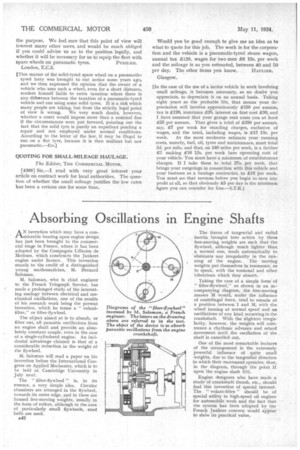OPINIONS and QUERIES
Page 59

Page 60

If you've noticed an error in this article please click here to report it so we can fix it.
A PLEA FOR THE MODERNIZATION OF OUR OBSOLETE ROADS.
The Editor, THE COMMERCIAL MOTOR.
[4304] Sir,—The Automobile Association calls attention to the existence in this country of thousands of miles of obsolete roads, notably in the depressed industrial areas and in counties mainly dependent upon agriculture. But for the late economic crisis these obsolete roads, it is stated, would by now be replaced by modern highways.
Here, surely, is a golden opportunity to translate present confidence, encouraged by the Chancellor's "Great Expectations" Budget, into action. By bringing the obsolete roads up to date, the Government and local authorities can at once assist agriculture, provide work for the most hardly hit among the unemployed and make a sound investment of public funds.
Considered testimony to the investment value of adequate highways is given in a recent comprehensive survey made by The New York Trust Company, one of the principal American banks. The United States, this authority points out in its official publication, "The Index," has constructed more modern highways than all the European countries, including Russia, put together, and has done so in a third of their combined area. As a consequence, new fields for manufacturing and agricultural industries and for investment have been opened up. Previously inaccessible natural resources have been tapped, real-estate values have been greatly enhanced, new holiday resorts have been made available, travel has been stimulated, and so on.
From the days of the Romans to those of Telford and Macadam and subsequently—witness the post-war rise of the British motor industry—America's experience is confirmed by our own.
Adequate highwaya always have been a condition of economic progress. Conversely, Great Britain will pay dearly for neglect of its roads as the demands of a recovering world make themselves increasingly felt.
F. A. 'LAWSON.
"THE C.M." AS A SOURCE OF INFORMATION AND ASSISTANCE.
The Editor, THE COMMERCIAL Moron.
[4305] Sir,—We beg to acknowledge receipt of your letter of May 3, for which please accept our thanks, also our appreciation of your offer of assistance.
We gain much from your journal and to us it is invaluable, giving us a lot of information and knowledge, for which, as readers, we again thank you.
New Malden. G. Cox.
' For Cox and Bond. FREE ASSISTANCE FOR SMALL HAULIERS SEEKING LICENCES.
The Editor, TiE COMMERCIAL MOTOR.
[4306] Sir,—May I point out through your columns that members of the Alliance of Owner-Drivers in difficulty over their licences (A or B) may obtain free assistance at this address any morning between 9.30 a.m. and 1 p.m,, except on Wednesdays and Thursdays. Membership of the Alliance is open to all small hauliers and part-time hauliers operating not more than six
vehicles. E. H. B. PALMER, Captain.
Hon. Organizing Secretary.
328, Coastal Chambers, Buckingham Palace Road, London, S.W.1.
VALUABLE INFORMATION FOR CARRIERS.
The Editor, THE COMMERCIAL MOTOR.
[4307] Sir,—I have bought The Commercial Motor for five years, and take this opportunity of thanking you, also congratulating you on such a valuable work.
I should also like heartily to congratulate you on your other publications, "The A B C of Goods Vehicle Licensing" and " London Wharves and Docks," which should be of great assistance to all in the haulage trade.
Wishing your journal every success.
Brighton. WALTER PACKHA M.
SOLID-TYRED SPARE WHEELS ON PNEUMATICTYRED VEHICLES.
The Editor, THE COMMERCIAL MOTOR.
[4308] Sir,—We operate a large fleet of 30-cwt. lorries on pneumatic tyres all round, but the spare wheel carried is solid tyred. We believe that there are some thousands of the same make and type on the road, and feel sure that a large number of them is also equipped with solid-tyred spare wheels.
One of our vehicles was recently stopped by a member of the mobile police and the driver was informed that if the solid spare were ever used in case oi a puncture we would be summoned immediately for the vehicle is licensed to be fitted with pneumatic tyres all round.
Naturally, in case of a puncture, when a solid-tyred wheel is used, the vehicle is for the time being not on pneumatic tyres all round, but this state of affairs can happen at only very rare intervals and for very short periods.
It would be a very costly procedure to equip our fleet with new pneumatic-tyred spare wheels, especially as the existing solid-tyred spares are satisfactory and answer, B41
the purpose. We feel sure that this point of view will interest many other users, and would be much obliged if you could advise us as to the position legally, and whether it will be necessary for us to equip the fleet with
spare wheels on pneumatic tyres. PUZZLED. London, E.C.3.
[This matter of the solid-tyred spare wheel on a pneumatictyred lorry was brought to Our notice some years ago, and we then expressed the opinion that the owner of a vehicle who uses such a wheel, even for a short distance, renders himself liable to extra taxation where there is any difference between the taxation of a pneumatic-tyred vehicle and one using some solid tyres. It is a risk which many people are taking, but from the strictly legal point of view is wrong. We very much doubt, however, whether a court would impose more than a nominal fine if the circumstances were put forward, pointing out the fact that the solid tyre is purely an expedient pending a repair and not employed under normal conditions. According to the letter of the law, it may be illegal to run on a flat tyre, because it is then resilient but not pneumatic.—En.]
QUOTING FOR SMALL-MILEAGE HAULAGE.
The Editor, THE COMMERCIAL MOTOR.
[4309] Sir,—I read with very great interest your article on contract work for local authorities. The question of whether the small mileage justifies the low rates has been a serious one for some time.
Would you be good enough to give me an idea as to what to quote for this job. The work is for the corporation and the vehicle is a pneumatic-tyred steam wagon, annual tax £120, wages for two men £6 13s. per week and the mileage is as you estimated, between 40 and 50
per day. The other items you know. HAULIER.
Glasgow.
[In the case of the use of a motor vehicle in work involving small mileage, it becomes necessary, as no doubt you appreciate, to depreciate it on an annual basis. Taking eight years as the probable life, that means your depreciation will involve approximately £150 per annum, tax is £120, insurance £25, interest on first cost £30, and I have assumed that your garage rent costs you at least £25 per annum. That gives a total of £350 per annum, say, £7 per week for standing charges, exclusive of wages, and the total, including wages, is £13 13s. per week. At the most moderate estimate your running costs, namely, fuel, oil, tyres and maintenance, must total 3d. per mile, and that, on 240 miles per week, is a further £8 making £16 13s. per week bare operating cost of your vehicle. You must have a minimum of establishment charges. If I take them to total 27s. per week, that brings your outgoings in connection with this vehicle and your business as a haulage contractor, to £18 per week. You must see that revenue before you begin to earn any profit at all, so that obviously £5 per day is the minimum figure you can consider for hire.—S.T.R.]




































































































